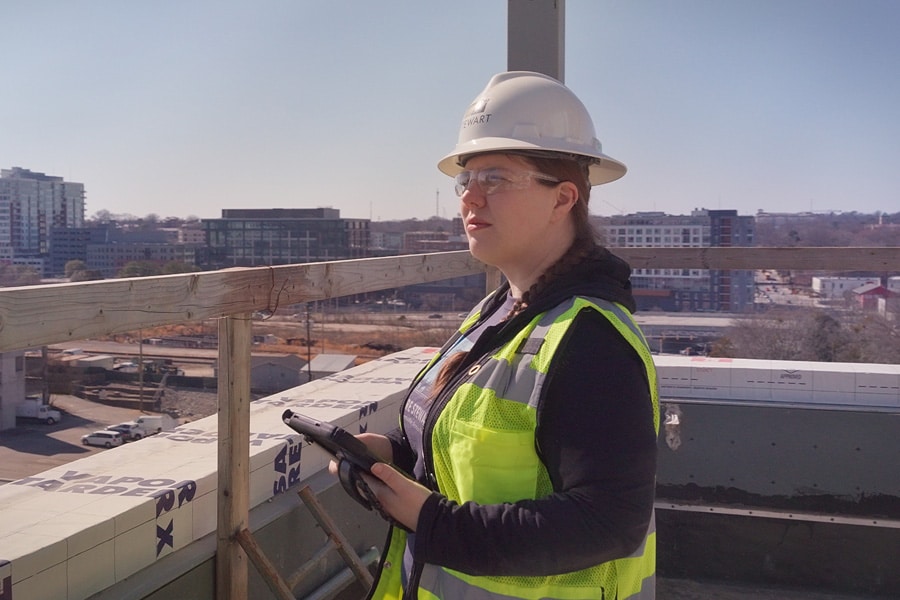Fernanda Leite isn’t afraid of chaos.
In fact, when she visited a construction jobsite as a child, the disorder and apparent confusion of the commotion surrounding her was among the experience’s most attractive components.
“I was impressed by the chaos as people were everywhere, and I knew I wanted to be part of this world,” Leite (pronounced Lay-che) said, reflecting on the visit organized by her grandfather, who at the time worked as a developer in the family’s native country of Brazil.
Leite’s career path in construction would go on to be anything but conventional. Indeed, the childhood jobsite visit inspired her to enter construction, but not in a traditional industry trade.
Mentors along the way
After earning a doctorate from Carnegie Mellon University, Leite is now an associate professor in construction engineering and project management at the University of Texas at Austin (UT). She said her career in construction academia has taught her the importance of embracing and fostering mentorship.
Leite’s grandfather was one of her first mentors. “He read a lot, exposed us [his grandchildren] to new things and challenged us,” Leite said. Although her grandfather wanted her to continue a career in the family business, she had different plans, which did not initially include working in construction.
While in college in Brazil, Leite taught English as a second language in an after-school program for school-aged kids, an experience she loved. Still, Leite’s passion for construction persisted. After earning her undergraduate degree, Leite worked for two years in the field in Brazil, completing engineering and design work on high-rise construction projects. The experience deepened her passion for the industry.
“There’s something new with every project each day and something tangible at the end,” Leite said. “It’s a dynamic work environment that includes working with teams of people across disciplines.”
After a talk with her father—a college professor—discussing her competing passions, he said: “It sounds like you need to be a university professor,” and he encouraged Leite to get a Ph.D.
Leite took the advice and went on to Carnegie Mellon University (CMU) in Pittsburgh.
At CMU, Leite found another mentor: her Ph.D. supervisor, Burcu Akinci, a female scholar in the field of computing in civil engineering. “I learned from her about the challenges related to balancing a family and a profession,” Leite said.
Time to be a role model
Leite sees mentorship as a crucial tool in helping more women advance in the construction industry.
“I’m used to going to meetings and being the only woman in the room,” Leite said, “but we need more women in construction.” One way she thinks that can happen is for women to occupy leadership roles so young women can see them as role models.
This is why Leite has positioned herself as a role model in her job as a professor.
Leite’s position at UT includes teaching three courses per year. Students appreciate her courses, Leite said, because they are hands-on, applicable and regularly updated. “I show the students my passion for the topic, and they learn how innovative the construction industry is by being exposed to the real world via industry-mentored case study projects and guest lectures by industry innovators,” she said.
And like her grandfather was for her, Leite views herself as a cheerleader and mentor for her students—in the classroom and beyond. “Female Latina students who never took a course with me come to talk to me for undergraduate advising,” Leite said.
“I tell my students it’s important to find mentors,” Leite said. “Industry is embracing female professionals, and there are many opportunities for growth.”
Another piece of advice Leite gives her students is to expose themselves to different areas and career paths to find their passion. Leite also talks with her students about the challenge of being a project manager in construction. “A project manager has to live where the project is, and regularly uprooting is challenging when you have a dual-career family,” she said.
The other part of Leite’s role at UT centers around research. Her primary areas of interest are building information modeling (BIM) and sustainable systems engineering. Leite is also part of a research project called Planet Texas 2050.
The 10-year project began in 2018 and was formed based on the possibility that Texas’ population could double by 2050. The aim is to develop interdisciplinary knowledge and community-based strategies to help the state handle the climate changes that may arise with such massive population growth.
There are 120 researchers spread over 10 different colleges on the UT campus involved in the initiative. Leite is part of the leadership team and previously served as the chair. “It’s fun to learn new methods and bring different researchers together to work toward a common goal,” said Leite, who has also received awards for her research.
In the end, Leite’s passion for construction continues to be rooted in the feeling she got the first time she stepped on a jobsite—even though her work in the industry today takes place primarily in classrooms on a university campus.
A few years ago, Leite went back to Brazil to present at a conference. Her grandfather, one of her first mentors, was in the audience. “He saw from the talk how my work applied to construction, and he said, ‘I completely understand and respect your decision to go into research,’” Leite said.
There’s nothing like getting the support and approval of a mentor.















